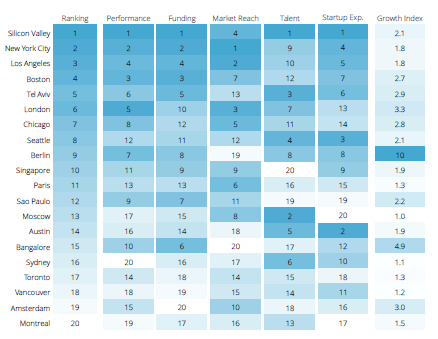By Richard Florida,
Challengers to Silicon Valley include New York, L.A., Boston, Tel Aviv, and London.
Silicon Valley and the San Francisco Bay Area have long been the world leaders in high-tech startups, giving rise to cutting-edge companies from Apple and Intel to Google, Facebook, and Twitter. But recent years have seen the rise of an increasingly potent group of cities around the world that are generating new startups in creative and unique ways.
The 2015 edition of the Startup Genome Project from Compass (I wrote about the previous edition of the report back in 2012) provides a new ranking for the world’s leading startup cities. The report is based on data from 11,000 global startup companies, interviews with more than 200 entrepreneurs worldwide, and data from Crunchbase and other sources. Its ranking gauges the world’s leading startup ecosystems—the broad infrastructure of talent, knowledge, entrepreneurs, venture capital, and companies that make up a startup community. The report measures these ecosystems based on their quality of talent, pool of venture capital resources, experience and mentorship provided by startup founders, market reach of their companies, and the ultimate performance and exit value of their companies. (One omission of the report: due to language barriers, it was not able to collect sufficient data to evaluate cities in China, Taiwan, Japan, or South Korea.)
The graph below shows the top 20 global startup ecosystems in the world, according to the study:

Silicon Valley again tops the list, as it did back in 2012. New York rises to second place, up from fifth in 2012. Los Angeles is third and Boston fourth. Boston’s fourth-place finish may come as a surprise, as its much-heralded Route 128 high-tech cluster was long considered to be the number two place for startups. All in all, U.S cities took the top four spots, and seven crack the top 20, with Chicago seventh, Seattle eighth, and Austin 14th.
But we can also see the rise of significant startup ecosystems in cities around the world. Tel Aviv is fifth, London sixth, Berlin ninth, and Singapore 10th. Three Canadian cities make the top 20—Toronto comes in at number 17, Vancouver at 18, and Montreal at 20.

Half of the world’s leading startup ecosystems are in the U.S. and Canada, and 16 of 20 span North America and Europe. That said, the rankings of Tel Aviv, Singapore, São Paulo, and Bangalore show that startups are taking shape in the so-called emerging economies. And it is likely that cities in China and other Asian nations would have scored highly if data were available.
The report also charts the trajectories of the world’s leading startup cities, with Silicon Valley remaining far and away in front. Despite the fact that other global startup centers are developing at a faster pace, the report expects Silicon Valley to hold on to its lead for the foreseeable future. It also ranks the fastest moving startup cities as New York, Austin, Bangalore, Singapore, and Chicago. The study sees New York, as well as Toronto, Seattle, and Boston, as startup ecosystems that are nearing their peak or “financial equilibrium.” Conversely, it sees Amsterdam, Paris, Chicago, and Berlin as developing startup ecosystems that have considerable room to grow and develop.
What can policy-makers and urban leaders do to better facilitate world-class startup ecosystems? While the business, entrepreneurial, and technological communities remain their drivers (and whole startup ecosystems tend to develop organically), a recent report by the British innovation think tank Nesta outlines three key things governments can do to bolster such ecosystems: take a cross-disciplinary approach to champion innovation and entrepreneurship across functional areas and departments; work with other outside governments to identify, address, and solve key problems; and think like a startup, not a government agency.
Most of all, cities and urban leaders can and should work together to bolster their startup ecosystems. “Cities don’t need to compete against each other always,” says Andrew Collinge, Assistant Director of Intelligence and Analysis at Greater London Authority. “Indeed, they should seek to compete together whenever they can. It is through friendly competition and collaboration that we will make progress.”
At the end of the day, this new ranking suggests that the world of startups remains spiky, with many of the most powerful global cities like New York and London (known more as financial centers than high-tech locations) coming to the fore as centers for startups and innovation. Startups also appear to be gravitating to denser, more diverse, more energized urban centers, and away from their traditional locations in suburban office parks. This is not just the case in New York, London, Berlin, and Paris, but in the Bay Area as well—my ongoing research has shown a shift in startup activity in the suburbs of Silicon Valley to urban districts in and around downtown San Francisco.
That shift is not only bringing innovation and startups back to cities, but also causing a new set of tensions between techies, local residents, and local governments. Still, it makes little sense to dampen startups, innovation, and the entrepreneurial impulse, all of which drive urban growth and provide the revenues for much-needed improvements in transit and housing. As rising startup urbanism puts additional pressure on housing prices in already pricey areas, now more than ever, it’s time to find a better balance between the two.
http://www.citylab.com/tech/2015/07/the-worlds-leading-startup-cities/399623/
Tags: Amsterdam, austin, Berlin, Boston, canada, Chicago, entrepreneurship, LA, London, Montreal, moscow, new businesses, North America lead the way in top start-up locations, NYC, paris, San Francisco, Sao Paulo, Seattle, silicon alley, silicon valley, singapore, start-up clusters, start-up communities, start-up urbanism, Sydney, Tel Avivi, Toronto, USA, Vancouver, world's leading start-up cities, world’s leading startup ecosystems
 Oxstones Investment Club™
Oxstones Investment Club™